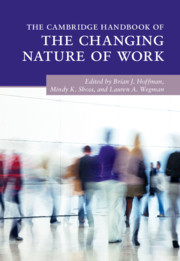Book contents
- The Cambridge Handbook of the Changing Nature of Work
- The Cambridge Handbook of the Changing Nature of Work
- Copyright page
- Contents
- Figures
- Tables
- Contributors
- Part I Introduction to the Changing Nature of Work
- Part II What Has Changed?
- 4 Changes in Technology
- 5 The Changing Nature of Work
- 6 Changes in Occupations, Jobs, and Skill Polarization
- 7 Changes in the Legal Landscape
- 8 The Rise and Decline of Organized Labor in the United States
- 9 Changes in Organizational Income Inequality
- 10 Work and Employment in Fluid Organizational Forms
- 11 Changes in Worker Demographics
- 12 Generational Changes in Personality, Values, and Abilities
- 13 Changes in Work Behavior Patterns
- Part III Implications for Talent Management and Impact on Employees
- Index
- References
13 - Changes in Work Behavior Patterns
from Part II - What Has Changed?
Published online by Cambridge University Press: 02 April 2020
- The Cambridge Handbook of the Changing Nature of Work
- The Cambridge Handbook of the Changing Nature of Work
- Copyright page
- Contents
- Figures
- Tables
- Contributors
- Part I Introduction to the Changing Nature of Work
- Part II What Has Changed?
- 4 Changes in Technology
- 5 The Changing Nature of Work
- 6 Changes in Occupations, Jobs, and Skill Polarization
- 7 Changes in the Legal Landscape
- 8 The Rise and Decline of Organized Labor in the United States
- 9 Changes in Organizational Income Inequality
- 10 Work and Employment in Fluid Organizational Forms
- 11 Changes in Worker Demographics
- 12 Generational Changes in Personality, Values, and Abilities
- 13 Changes in Work Behavior Patterns
- Part III Implications for Talent Management and Impact on Employees
- Index
- References
Summary
Workers across the globe have evolved in their patterns of work, with increased flexibility emerging as a central theme. We highlight three forms of flexibility that workers have increasingly demanded: flexibility in location, schedule, and work design. We argue these capture the broad ways in which workers seek to structure and balance their work and nonwork lives, as well as their careers overall. We describe the evolution of each form of flexibility, review the benefits and challenges, and outline avenues for future research. Finally, we highlight a unique work arrangement, or setting, that infuses flexibility in unique ways – coworking spaces. We review what we know so far about coworking spaces, which have proliferated far faster than the scientific research that seeks to understand them. We conclude by outlining questions that may be good first priorities for emerging scholarly research in this area.
Information
- Type
- Chapter
- Information
- The Cambridge Handbook of the Changing Nature of Work , pp. 274 - 294Publisher: Cambridge University PressPrint publication year: 2020
References
Accessibility standard: Unknown
Why this information is here
This section outlines the accessibility features of this content - including support for screen readers, full keyboard navigation and high-contrast display options. This may not be relevant for you.Accessibility Information
- 1
- Cited by
